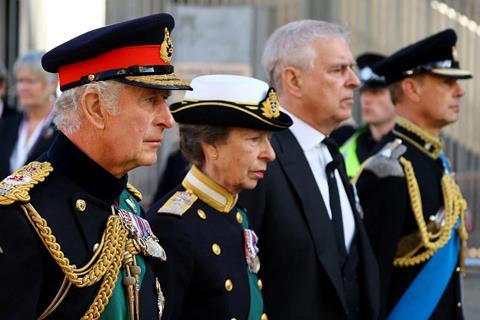The function of the funeral is as vital to state as it is to the individual, says George Pitcher. Here’s how it helps us in our grief

Anyone who has presided at a funeral service will be familiar with what greets them when they turn from the procession into the church.
Sad faces, of course, pale and bereft in desolation; some serious and resigned, others looking towards the minister in expectation, and not a little hope, that we may have a magic answer.
But there’s often another expression on those faces, and it’s one of bewilderment: Why are we here? What’s happening? What’s all this about – this flummery, these flowers and black ties, this person at the front in robes, reading sentences from scripture?
Ahead of Queen Elizabeth II’s funeral on Monday, this sense of bewilderment and these questions are playing out on a national level and a much grander scale. I’ll come to the Queen’s funeral in a moment but, first, what is the purpose of any “ordinary” funeral?
Funeral functions
All priests will have their own way of trying to address the bewilderment of mourners, including the nearest and dearest of the deceased, at a funeral. Anglicans are fond of absorbing three points from their clergy, so here is my trilogy of funereal purposes:
Firstly (and perhaps principally), we quite obviously come to mourn our loss. This means, for those of us of faith at least, offering up our grief to the one who longs to bear it with us, and for us. A more tangible metaphor might be that we are laying our grief at the literal foot of the cross – a visually physical act of joining our grief with the desolation and darkness of the crucifixion. The important thing here is that we try to let that grief go; we still own it, but we acknowledge that it has been a very real part of Christian life since the beginning of our story.
The Queen’s time had come, after a life well lived. She is at grateful rest
Secondly, we gather to comfort one another in our grief. This isn’t just an important part of sharing it, it also enables the love of God to overflow into the world through us. Of the many words for love in ancient Greek, this is agape, or caritas in Latin, which gives us our word “charity” – the human instinct, or spirit, to show love and comfort to those in distress.
Thirdly, we gather to resolve to use the time we have left in this world to shine as a light of love in the hearts of those who love us, just as the one who has departed this life so shone in ours. If you like, we come together in the hope that, when we are gone, we can justify a gathering-in-love of our mourners too.
Healthy expression
All of these are what we might call metafunctions of the state funeral for the Queen. It’s an opportunity for a collective outpouring of national grief for who and what we have lost – and a safe and controlled opportunity for it. It’s also an opportunity to share and comfort one another in that grief – and to witness to the love of God in doing so. Finally, it’s a chance to follow her example in any way we can – serving others, pointing our lives towards a service of something that is greater than all of us.
The management of grief is a complicated exercise. The human body and mind miraculously manages it, for most us, by dripping its symptoms gradually into our system – to suffer the enormity of it all at once would surely kill us. So it is that sometimes we will feel deep sadness (bursting into tears suddenly in the supermarket), anger (an irrational fury that they’ve left us) or denial (expecting them to walk through the door; taking two cups out of the cupboard for coffee).
Guilt in grief
But there can be unhealthy aspects to the processing of grief too. One of the most potentially harmful of these is survivor guilt. This will manifest itself most obviously in torturous mental sentences that start with: “What if…?” or “If only…”
We come together in the hope that, when we are gone, we can justify a gathering-in-love of our mourners too
In relation to a state or royal funeral, this symptom of grief may have been most apparent after the untimely death of Diana, Princess of Wales in 1997. It’s dangerous to make unqualified generalisations, but the emotional seizure of the nation at that time may have had not a little to do with collective guilt: What if we hadn’t treated her as a form of media entertainment? If only we had seen her as a person, rather than a character in a soap opera.
Again however, note the physical and metaphorical response in those strange days, some 25 years ago. As the crowds lay a mountain of flowers outside Diana’s home, they may as well have been laying that guilt at the foot of the cross.
That will be a public urge that is missing from the Queen’s funeral, one hopes. By contrast, her time had come, after a life well lived. She is at grateful rest. It’s just that we who remain need to know what we’re doing, as we look on at her obsequies.






































2 Readers' comments